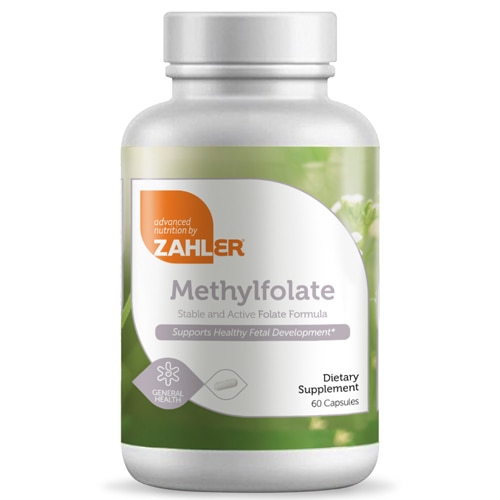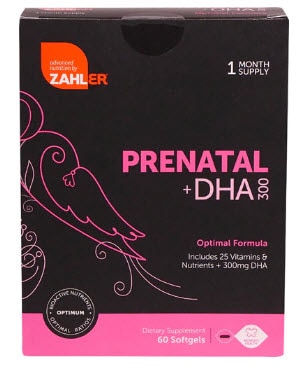“Do you plan on starting a family?” It’s the question almost every woman in their 20s and 30s gets asked at the doctor’s office – and for good reason. Your doctor is phishing for answers, because they want to make the best recommendation for your health. More than that, they’re thinking about the health of your future family. So when you give a positive response, expect your doctor to talk about why you should take prenatal vitamins. While it may seem like a rote medical speech, your doctor actually has good reasons for suggesting a prenatal.
Argument #1: Certain nutrients are essential to future moms
Folate
There are several essential nutrients during pregnancy, but folate has to be the most talked-about vitamin for mothers-to-be. Though folate has many functions in the body, it’s best known for its role in red blood cell formation. Without adequate folate during pregnancy, neural tube defects can develop, including spina bifida and anencephaly. These are serious, and sometimes fatal, conditions that can easily be prevented with sufficient folate consumption.
Over the last half-century, health professionals have recommended that all women of child-bearing age ingest at least 400 micrograms of folate daily. During pregnancy, the Recommended Dietary Allowance (RDA) jumps to 600 micrograms per day. For women in nutritional poverty, the recommended intake may be even higher.
Reaching these recommendations is fairly easy with a well-balanced diet that includes eggs, legumes, broccoli, beets and Brussels sprouts. But because many pregnancies are unplanned and neural tube defects occur so early in development, the Food and Drug Administration (FDA) decided to take a proactive approach. In 1998, the FDA mandated that all grain products be fortified with folate. This was when folic acid, the synthesized version of folate, first appeared in the food supply. (Brush up on the difference between these two: folate vs. folic acid.)
Folic acid-fortified foods resulted in a 25- to 30-percent reduction in the number of births with neural tube defects. That said, some women still have trouble getting enough folate from food alone. In these cases, there’s great support of folate supplementation, especially for women in their child-bearing years.
DHA
Of course, it’s not just folate (or folic acid). The omega-3 fatty acid docosahexaenoic acid (DHA) has numerous health benefits, as well. In fact, your brain is mostly made up of fats, and the majority of those fats are DHA. Thus, it is a key nutrient in brain health and development. This nutrient is also important for healthy development of the eyes.†
Unfortunately, the body doesn’t make enough DHA on its own, which means your diet has to pick up some of the slack. If you don’t eat fatty fish or snack on seaweed, a DHA supplement – or prenatal with DHA – can fill in the gaps.
Argument #2: Certain nutrients are important for a growing baby
DHA
Mothers aren’t the only ones who need DHA. While DHA is important for adults, research has shown that maternal DHA levels directly impact the development of baby’s cognition and vision health. Cognition includes mental processes such as awareness, perception, reasoning and judgment. Meanwhile, visual acuity – or clearness of vision – is dependent on the brain’s interpretative ability. These are crucial elements of early child development, which can be supported by the mother’s DHA intake.†
Chromium
Chromium is another nutrient worth knowing. Chromium is an essential mineral that promotes insulin activity in order to support healthy blood glucose levels. Pregnancy can bring about changes in glucose homeostasis. This is why pregnant women are often advised to consume chromium-rich foods, such as whole grains and meats. However, chromium isn’t just for the mom-to-be. It can help support healthy blood sugar levels of the newborn, as well. To ensure both you and baby are getting adequate chromium, shoot for the recommended 29 to 30 micrograms per day.
The verdict: prenatal vitamins supply these nutrients
Medical research has clearly established that the lifelong health of a child depends largely on the mother’s health and nutrition during pregnancy. In an ideal world, every woman’s diet would provide exactly the right balance of nutrients to support her health as well as the health of her developing baby.
The fact is, some sources of vitamins and herbs are not in a form which the body can easily digest. Sometimes the digestive system must perform complex conversions before the vitamin is available for nutritional purposes. In other cases, the nutrient remains undigested and is eliminated in waste matter. Another possibility is that vitamins are not digested properly and build up in the bloodstream.
To help prevent nutritional deficiencies, prenatal vitamins were born. Of course, not all prenatal formulas are created equal. Which one you take largely depends on personal preference. But when you’re looking for a high-quality option, don’t forget the key nutrients discussed here. Zahler’s Prenatal + DHA 300 is a balanced, synergistic composition of readily available nutrients. It supples 1,000 micrograms of natural folate, sourced from Quatrofolate, the most stable and bioactive form on the market. It also features 300 milligrams of DHA and 400 micrograms of chromium, so you can provide the best possible start for your family.





